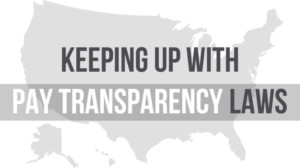
Employers often ask me, “Can we have a policy requiring employees not to discuss compensation?” Not anymore! In most circumstances, employers cannot legally ask employees to keep their pay secret. Several years ago, the National Labor Relations Act (NLRA), which covers all employers, made salary secrecy against federal law. Furthermore, the number of state laws prohibiting pay secrecy continues growing. Laws vary from state to state, but they prevent employers from retaliating against employees who discuss their wages with other employees.
Pay transparency is the employer practice of openly sharing information regarding job salaries and pay ranges within an organization. This means employees have access to information about what others are being paid for similar roles and the criteria used to determine compensation. Pay transparency is often seen as a way to promote fairness and reduce pay discrimination within organizations. It also helps employees understand how to advance their careers and earn higher salaries. However, the level of transparency can depend on the organization, culture, industry, and legal requirements.
The dilemma for companies is the current workforce questions and complaints regarding individual pay equity. Employee morale issues may ensue when some employees discover they are being paid at the low end or below a posted range. Moreover, potential pay equity lawsuits when employees believe pay differentials within the organization are due to protected characteristics such as race, ethnicity, or sex. (My next newsletter – Pay Equity)
The challenge for multi-state employers is that they must comply with each state they have employees. To add more complexity to pay transparency laws is the hybrid or remote workforce. If you have a remote employee living in one of the states with transparency laws or in some states, if the work CAN BE performed in the state, you must comply with that state.
California, Colorado, Connecticut, Maryland, Nevada, New York, Rhode Island, and Washington require employers to provide compensation ranges to job applicants. States considering transparency laws include Hawaii, Illinois, Kentucky, Massachusetts, Montana, New Jersey, Oregon, Pennsylvania, South Carolina, South Dakota, Vermont, Virginia, and West Virginia. Several cities have also adopted wage transparency laws (Cincinnati, Jersey City, Ithaca, New York City, Toledo, and Westchester County.
Some new laws require covered employers to disclose a good faith pay range for each advertised job. In contrast, others also require disclosure of information about other compensation and benefits, such as bonuses, commissions, and health insurance. Some new laws also require employers to disclose internal promotion and transfer opportunities and the pay associated with these opportunities to current employees. California and Illinois require certain employers to submit their pay data to the state.
What are Employers’ Consequences?
Failure to comply may result in an administrative enforcement action or private lawsuit. In addition, some jurisdictions impose significant civil penalties for noncompliance with pay transparency requirements—for example, up to US$10,000 per violation in California and Colorado and up to US$250,000 per violation in New York City.
My next employer alert will be about Pay Equity! Please get in touch with our office if you have any compensation challenges.
Re: SHRM.org
